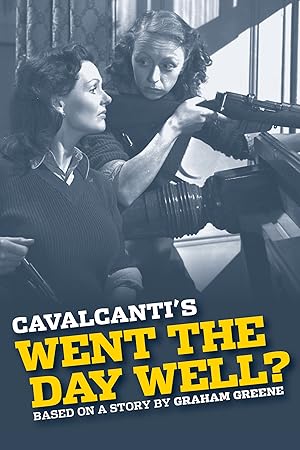
Went the Day Well? Page #5
Dear Tom. Dear, dear...
It's like old times to hear
Bill Purvis's shotgun again.
He gave me a rabbit yesterday.
Black market?
Wedding present.
That must be Joe Garbett
coming to have a look.
That's torn it.
If we budge, he'll hear us and if we don't,
he's sure to come and catch us.
Not if I knows anything.
Now you stay where you are.
And 'ang on to Betty.
When I whistle for 'er
ten times, let her go.
- Then you nip off home, see.
- Okay. What about tomorrow night?
Eleven o'clock. Same place.
Betty?
- Still, Betty. Still.
- Betty!
Where are you, lass?
Five...
Not yet, Betty.
Six...
- Oh, good evening, Mr Garbett.
- Evening, Bill.
That dog of mine run off again,
so I just come in to have a look for 'er.
Beth'!
I heard a couple of shots up this way
a moment or two ago.
- Didn't happen to have a gun with you?
- A gun, ha!
When I'm just out looking for me dog.
That dog of yours doesn't seem
to be around here at all.
Nine.
Ten. Phew!
Trespassing in Manor Wood
and no reasonable excuse.
Psst.
Where you been, you wicked lass?
Gettin' your master into trouble
with the constable.
Very nearly.
Well, I must be getting along to me supper,
got a nice stewed rabbit.
- Rabbit?
Got run over, I suppose.
- Goodnight, Mr Garbett.
- Goodnight, Bill.
Come on, Betty.
- Evening.
- Good evening.
What will you have?
- Bitter.
- Light ale.
- Same.
- Yes, sir.
Here you are, Jim.
- Ah, thank you.
- Evening, ma'am.
- Oh, good evening.
- Will you take a drop of something?
Well, that's very kind of you, I'm sure.
I wouldn't say no to a small port.
MAN:
Seventy-two.Billets nice and comfortable, I hope?
Billets? Oh, yeah.
Fred was saying quite home from home,
weren't you, Fred?
- That's right.
- Bit of excitement for us.
We never had so many foreigners
in the village before.
- Foreigners?
- Well, strangers to these parts, like.
We always call 'em
foreigners round this way.
That'll be two and six, please, sir.
- Two beers, Jim.
- Righto, Pat.
Thank you, sir.
Your very good health and down with Hitler.
Goodness, how dreadful,
I've only just realised.
Realised what?
It was seeing you again made me remember.
I never took it up to the
- The telegram. Oh!
- You had it at the hall.
I must have left it there then. I'd better
pop round and see if I can find it.
There's a guard on the door.
He won't let you pass.
Be a good Samaritan and come with me,
won't you?
Come on, be a dear.
- Another game?
- No thanks, I've had enough.
How much do we owe?
- Let's see now, in English money that's...
- Pay attention!
This lady's lost a telegram.
Anyone seen such a thing?
Translation
Translate and read this script in other languages:
Select another language:
- - Select -
- 简体中文 (Chinese - Simplified)
- 繁體中文 (Chinese - Traditional)
- Español (Spanish)
- Esperanto (Esperanto)
- 日本語 (Japanese)
- Português (Portuguese)
- Deutsch (German)
- العربية (Arabic)
- Français (French)
- Русский (Russian)
- ಕನ್ನಡ (Kannada)
- 한국어 (Korean)
- עברית (Hebrew)
- Gaeilge (Irish)
- Українська (Ukrainian)
- اردو (Urdu)
- Magyar (Hungarian)
- मानक हिन्दी (Hindi)
- Indonesia (Indonesian)
- Italiano (Italian)
- தமிழ் (Tamil)
- Türkçe (Turkish)
- తెలుగు (Telugu)
- ภาษาไทย (Thai)
- Tiếng Việt (Vietnamese)
- Čeština (Czech)
- Polski (Polish)
- Bahasa Indonesia (Indonesian)
- Românește (Romanian)
- Nederlands (Dutch)
- Ελληνικά (Greek)
- Latinum (Latin)
- Svenska (Swedish)
- Dansk (Danish)
- Suomi (Finnish)
- فارسی (Persian)
- ייִדיש (Yiddish)
- հայերեն (Armenian)
- Norsk (Norwegian)
- English (English)
Citation
Use the citation below to add this screenplay to your bibliography:
Style:MLAChicagoAPA
"Went the Day Well?" Scripts.com. STANDS4 LLC, 2024. Web. 25 May 2024. <https://www.scripts.com/script/went_the_day_well_23229>.


Discuss this script with the community:
Report Comment
We're doing our best to make sure our content is useful, accurate and safe.
If by any chance you spot an inappropriate comment while navigating through our website please use this form to let us know, and we'll take care of it shortly.
Attachment
You need to be logged in to favorite.
Log In